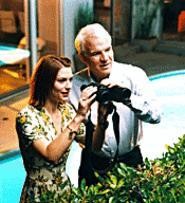Granted, Martin merely wrote the script; Anand Tucker (best known for Hilary and Jackie) directed. But that script -- with its cloying voice-overs, unctuous pretensions toward romance, and gaping lack of character development (and all in the later scenes) -- is largely the problem. Well, the script and the violins. God, those violins.
Mirabelle Butterfield (Claire Danes) is a young woman wasting away at a Saks glove counter. Sequestered one floor above the bustling cosmetic kiosks, in the hushed and hallowed halls of haute couture, Mirabelle whiles away her time in near-solitude. Back at her starter apartment, she reads thick novels, sketches in charcoal, and talks to Sylvia, her cat. With her Victorian-tinted name and bookish ways, she's a romantic heroine, a hidden beauty yet to be discovered (read: rescued) by the man who deserves her.
But Shopgirl cuts through this crap, at least at first. Mirabelle meets Jeremy (the sublime Jason Schwartzman), a grimy artiste whose medium is fonts. Martin gets some great comedic mileage out of that -- "I come here to think about fonts," Jeremy says of the garishly commercial Universal Studios CityWalk -- as he does from the guy's failure to have matured beyond a beer-and-TV-besotted post-adolescence. Jeremy is a mess: unshorn, unshaven, unmannered, unsalaried, and, it seems, unaccustomed to dealing with women. He doesn't know how to treat them.
Who does? Ray Porter. That's Martin's role, and it's an odd one, a fiftysomething technology kajillionaire with two architecturally striking houses and a private jet, but not the slightest iota of personality. Porter's opening salvo is an act of pure romance: He buys a pair of long, black gloves from Mirabelle (at a sleek $145) and sends them to her apartment, with a note asking her to dinner. She accepts, and he wines and dines her through their first few dates. He's a gentleman, never assuming, never insinuating, as Jeremy had. Enter the violins. Most of the Mirabelle/Ray scenes are awash in strings, bathed in twinkling amber light, and implying a connection that we never see. What do these people share? Who is Ray? And why does he want Mirabelle?
Several times during Shopgirl, the film pauses for a voice-over, delivered by Martin as though he were reading directly from his novella. (He may be.) These are largely jarring and don't make much sense: It's an omniscient narrator, read by an actor playing one of the roles. During the voice-over that interrupts the Ray/Mirabelle courtship, Martin points out that Mirabelle asks Ray many questions, but never the one that pulses within her: Why her? Here's another stumper: Why is Ray asking a question about himself, for Mirabelle? Both questions go unanswered.
With Ray, Shopgirl sets in motion a sugar-daddy love story of Hollywood proportions, swelling with turgid music as the couple enjoy their silky sex (they call it "making love") in Ray's gorgeous bed, basking in the archetypal commerce of youth and money. (He gets to run his hands over her milky skin; she gets to run her hands over her new Armani gown.) But if we're meant to puzzle over whether Mirabelle is falling for Ray's property or his person, we can't: He is an utter cipher. And when it turns out that he, not she, is the one with relationship issues, we throw up our hands. What's the point?
It's hard to know why Martin went in this direction, from pinging comedy to blubbering sap, and why he wants Ray to remain such a ghost. It seems, however, that he has succumbed to fantasy, to the May-December fairy tale that Hollywood clings to and relentlessly promotes. And, like all romantic fantasies, this one requires that at least one character be a paper doll, constructed of nothing more than his type. After all, romantic fantasy dissolves in the face of reality -- real people with real personalities, needs, beliefs, and desires -- so if Ray were to have actual character traits, the violins would have to cease their whinnying, laying bare something far more specific, new, and complex. Alas, not this time.










